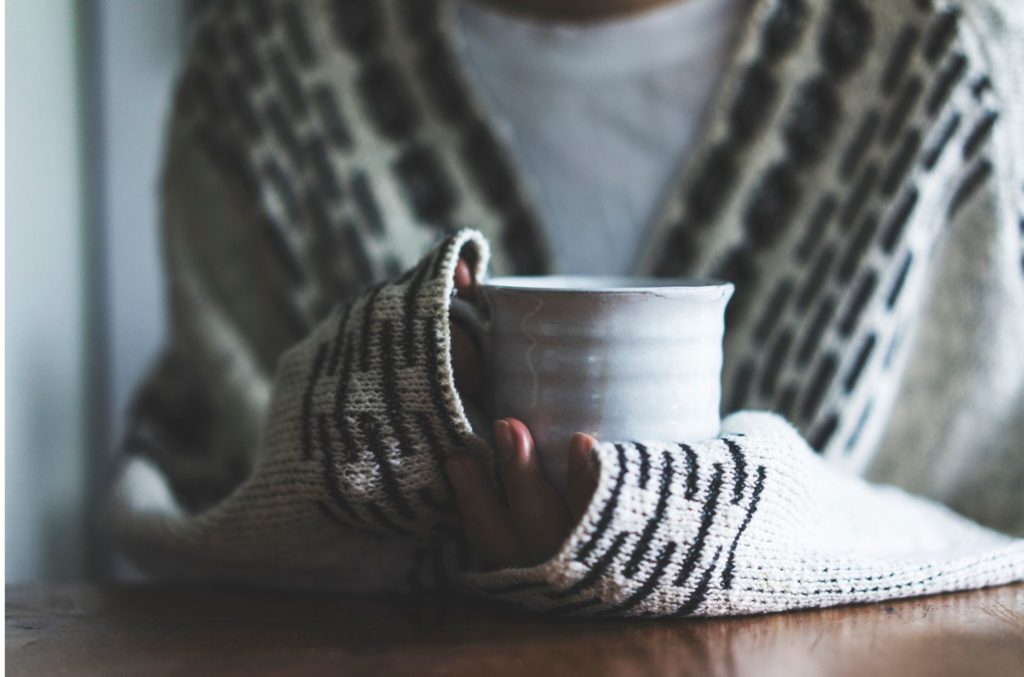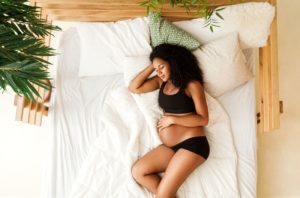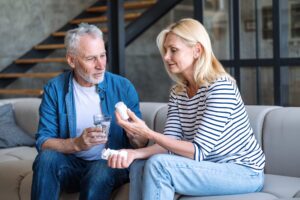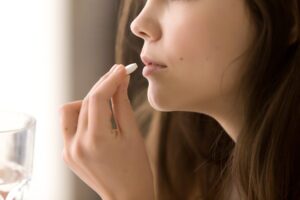Medical Review by Jennie Stanford, MD, FAAFP, DipABOM
Summary
- Engaging in pleasurable activities can benefit mental health for individuals dealing with anxiety and depression. However, alcohol consumption can exacerbate anxiety levels, leading to a phenomenon known as hangxiety, which manifests as intense feelings of anxiety following drinking episodes.
- Symptoms of hangxiety often include heightened anxiety, worry about actions taken while intoxicated, and disrupted sleep patterns as alcohol leaves the system.
- Alcohol affects neurotransmitter levels in the brain, initially increasing feel-good hormones like endorphins and serotonin while enhancing the activity of GABA receptors, which promote relaxation. However, as alcohol wears off, these levels drop sharply, contributing to heightened anxiety.
- Factors contributing to hangxiety include heavy or frequent drinking, predisposition to anxiety disorders, and individual sensitivity to alcohol’s withdrawal effects on the central nervous system.
- Treating hangxiety involves strategies like exercise, hydration, breathing exercises, meditation, nutritious eating, staying present-focused, and gaining perspective to alleviate symptoms.
- Preventing hangxiety in the future can be achieved through moderating alcohol intake, pacing drinks, maintaining hydration, eating before and during drinking, and ensuring adequate rest post-consumption.
- Seeking professional help is crucial for individuals experiencing persistent anxiety or difficulty controlling alcohol consumption, as alcohol misuse can worsen underlying mental health conditions over time.
For people with anxiety and depression, purposefully engaging in pleasurable activities can improve mental health. But, alcohol can cause your anxiety levels to increase. In fact, hangxiety can start just a few hours after drinking.
After a night of drinking, many people experience the typical symptoms of a hangover—nausea, headache, fatigue, sensitivity to light and sound, dizziness, and shakiness.
But for some people, these symptoms are overshadowed by what’s come to be known as hangxiety: intense feelings of anxiety, verging on dread, that follow an episode of drinking.
Are you experiencing anxiety or panic after a big night of drinking? We’ll help you understand why it happens, what to do about it right now, and how to prevent it in the future.
Why you get anxious after drinking alcohol
In the simplest terms, you get anxiety after drinking because of the effects alcohol has on your brain’s chemical levels and neurobiological processes. Anxious feelings after drinking are often attributed to the physiological experience of alcohol withdrawal.
Here’s how that happens. You’re out with friends after a long day of work, and you have a drink or two. When that alcohol gets to your brain, it triggers a chemical reaction in your brain’s pleasure center.
This reaction causes an influx of feel-good hormones like endorphins and serotonin. Plus, alcohol increases the activity of gamma-aminobutyric acid (GABA) receptors, which plays a central role in anxiety. When alcohol reaches the brain, it stimulates GABA activity, leading to feelings of ease and relaxation.
In simple terms, alcohol slows your brain down and body way down. Because alcohol has a depressive effect on your brain and the rest of your body, you may experience relief from anxiety after the first couple of drinks.
But what happens when the alcohol wears off? By the time it’s leaving your system, GABA levels fall off precipitously, leading to a heightened and anxious state.
Discover tools to stop a panic attack that work anytime, anywhere.
The experience of hangxiety
You might be experiencing it right now. The alcohol has worn off, and things don’t feel so good anymore. You may be worried about what you said to people or how you acted when you were intoxicated. The worry might even be so intense that it wakes you up from sleep when the alcohol is leaving your system.
Plus, if you drink often and in large quantities, your body compensates for the depressive effect alcohol has on your central nervous system (CNS). This system takes in information from your senses and processes it. It’s also responsible for controlling motor function, reason, and emotion.
Your brain may learn to make up for the depressive effects alcohol has on your CNS by keeping on high alert.
It’s an adaptive strategy while there’s alcohol in your system, but once the alcohol and its depressive effects wear off, your brain is left on high alert. This is another reason you may feel anxious after drinking alcohol.
Drinking heavily over the long term can cause disruptions to your brain’s normal chemical levels, leading to even more intense anxiety due to alcohol withdrawal.
On top of these factors, the common symptoms of a hangover, like dehydration, shakiness, increased heart rate, and low blood sugar, can cause feelings of restlessness and agitation.
Is addiction a disease? Get the info here.
Does alcohol cause anxiety?
What’s the relationship between alcohol & anxiety? Drinking alcohol interferes with your brain’s neurotransmitters. Again, alcohol triggers a release of feel-good hormones in the brain after a couple of drinks. But by the time you’re sobering up, these chemicals are gone.
This means that the levels of stress-relieving and pain-reducing hormones in your brain may be lower when you sober up than they were when you started drinking. And this can happen just hours after you’ve had a few drinks.
Doctors often attribute anxiety after drinking to withdrawal from alcohol. If you experience mild anxiety after having a few too many, it may be attributable to a much milder version of severe withdrawal. More intense versions of the same symptoms are commonplace for heavy drinkers and binge drinkers experiencing physical withdrawal from alcohol.
What’s more, many people use alcohol as a way to self-medicate mental health conditions, like social anxiety, generalized anxiety disorder, post-traumatic stress disorder (PTSD), and depression.
And people with an alcohol use disorder (AUD) are 2 – 3 times more likely to have anxiety. Unfortunately, using alcohol only worsens mental health issues in the long run.
Learn why alcohol and anxiety don’t mix.
Why don’t my friends get hangxiety?
Hangover anxiety doesn’t happen to everyone and, if you’re someone who experiences it, you’re probably wondering why. Here are the most likely contributing factors.
Predisposition to anxiety
If you already have an anxiety disorder or another mental health issue, like depression, it’s more likely you’ll be sensitive to anxiety triggers than those who aren’t predisposed to anxious and depressive feelings.
Shyness
A recent study suggests that being shy might be a subclinical indicator of social anxiety. And being shy makes it more likely that you’ll get relief from anxiety when drinking, but also more likely you’ll experience more extreme anxiety after the alcohol wears off.
Heavy drinking
It’s possible that the friends you drank with didn’t have as much to drink as you did. Or they may drink less frequently than you do. The more often and more heavily you drink, the greater the chances that you’ll experience anxiety as your body withdraws from alcohol.
Family history of anxiety
You might have a genetic predisposition to anxiety. This is especially likely if other members of your family have been diagnosed with anxiety disorders.
Find out more about alcohol and substance addiction here.
Treating hangover anxiety
So, if you’re feeling the effects of last night’s drinking, and you’re ready to start feeling better, here are 7 things you can do right now to combat hangxiety.
1. Get some exercise.
Exercise can have an immediate beneficial impact on your mind and body. That’s right, physical exertion in the form of moderate or vigorous exercise can lead to lower levels of anxiety and depression. Why? Exercise reduces stress hormones, such as cortisol and adrenaline, and triggers the release of endorphins, the body’s natural stress relievers and pain reducers.
2. Drink clear liquids.
Alcohol is dehydrating. When your brain doesn’t have enough water, both cognition and mood can decline. In fact, research suggests that decreased water consumption when drinking can lead to a decline in feelings of calmness, satisfaction, and positive emotions, as well as an increase in sleep disruptions, like insomnia.
Make sure you stay hydrated by drinking water and other clear liquids when recovering. You can also try sports drinks with electrolytes and other nutrients to help you replenish your body’s stores.
3. Do breathing exercises.
Press pause and take a few big breaths. Close your eyes and focus on deep, full inhales and long, slow exhales. If it feels okay, put special focus on lengthening your exhales, which triggers the body’s calming response and can have a relaxing effect on your whole system.
Try even more mindful breathing techniques to soothe anxiety.
4. Try meditation.
Meditation, especially in the form of mindfulness, has been proven effective at reducing anxiety levels. Mindfulness is the practice of watching your thoughts arise and pass away without judgment or entanglement.
Try it now. Take a few extra big breaths, close your eyes, and notice what thoughts are going through your mind. Notice each thought and label it as just that—a thought and nothing more. Just watch it come up and then fade away without believing what it says or getting hooked by it. Mindfulness is just one of a number of ways you can help calm anxiety.
5. Eat something nutritious.
You might want to nurse a hangover with greasy or fried food, but having something healthy and nourishing can help you recover faster. Eggs are a good choice, and so are nuts, spinach, avocado, and oatmeal.
6. Just do right now.
If you’re feeling panicky after drinking, you might be overwhelmed by all the things that need to get done. Instead of focusing on everything you can’t do while you’re taking care of yourself, just focus on the present moment and what needs to happen next. If you get hijacked by overwhelm, take a deep breath and put your energy toward the next right action.
7. Get some perspective.
Anxiety often focuses on and magnifies what’s wrong. That’s why saying how you feel out loud to an understanding friend can help improve your outlook. Try zooming out and widening the lens of your awareness to put anxious feelings in perspective.
If the anxiety lasts more than a couple of days or persists despite your drinking less, it’s a good idea to talk to a medical professional about anxiety treatment.
Learn how to reframe negative thinking with this mental health strategy.
Preventing hangxiety in the future
Now that you’ve recovered from this bout of hangxiety let’s talk about how you can avoid it going forward.
Drink less alcohol
Before you start drinking, set an intention around how much you want to drink. Once you’ve reached that limit, stop. Moderate drinking can be part of a healthy lifestyle, but some people find it hard to cut back, despite the consequences. If this is the case for you, it could be an indicator that you need more support.
Take your time
See if you can consume your drinks slowly, ideally 1 drink per hour. If your blood alcohol content (BAC) rises gradually, as opposed to rapidly, you’re less likely to experience withdrawal symptoms. In general, we recommend women not have more than 1 drink in a day and men no more than 2 drinks in a day.
Have more water
Try to match the number of alcoholic drinks you have with 8 oz glasses of water. Having enough water in your body means alcohol is less likely to dehydrate your system and lead to anxiety.
Eat something
Whenever possible, don’t drink on an empty stomach. Try to have something to eat before you start drinking. If you can, have another snack in between drinks. And if you’re hungry later on, have another light snack before going to sleep. This can help prevent nausea and upset stomach.
Get enough rest
After your night out, make sure to give your body ample time to rest and recover. Try to get at least 7 hours of sleep, so your body gets enough time to recharge.
Discover the most common causes of insomnia and how to treat them.
When to get help with your drinking
Because of the immediate relaxing effects of alcohol, many people with anxiety and other mental health issues are drawn to alcohol as a way to self-medicate. And, while it may offer some short-term relief, alcohol is not an effective long-term strategy for anxiety, depression, trauma, or other mental health issues. In fact, it can worsen all of these conditions.
Using alcohol to self-medicate is risky. Over time, your tolerance to alcohol increases, which means you need more and more of it to get the experience of ease and relief. Many people with anxiety are also prone to alcohol use disorder (AUD).
No matter how much alcohol you consume, if your drinking feels out of control, worries you, or worries those close to you, that’s a good enough reason to seek help.
No matter what your circumstances, it’s never too late—or too early—to reach out for assistance. There are many different ways to get help with your drinking, which means there’s probably at least one that’ll work for you. Learn more about alcohol treatment options.
Takeaways
- Drinking alcohol interferes with the chemical balances in your brain.
- Anxiety is a side effect of the withdrawal from alcohol.
- You can reduce hangxiety with exercise, hydration, breathwork, and mindfulness.
- You can also prevent it in the future by limiting your alcohol intake, staying hydrated, having enough to eat, and getting plenty of rest.












